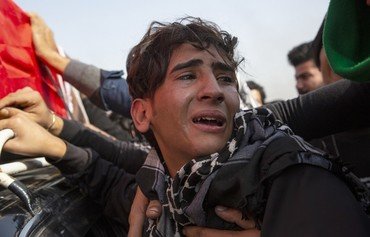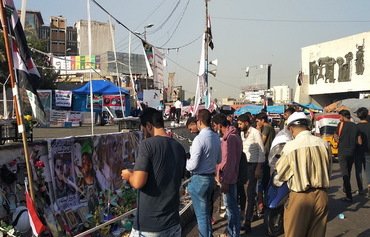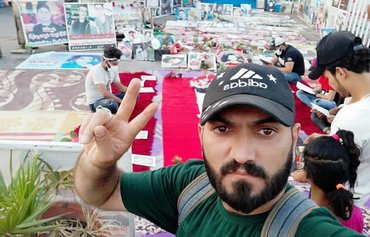Iraq's Independent High Commission for Human Rights on Sunday (December 15th) announced the Iraqi government will form a committee to investigate assassinations and kidnappings targeting activists in the Iraqi mass protests.
According to a reliable source, "the Ministry of Interior formed a special committee to conduct full investigations into the series of assassinations and kidnappings" that have targeted activists protesting in Baghdad and the south.
The ministry asked the commission to appoint a representative to the committee to monitor its work "in a way that is compatible with international standards as well as oversee the progress of the investigations", the source told Diyaruna, speaking on condition of anonymity.
He said he hoped the committee would bring forth "positive results that lead to revealing the identities of the perpetrators so they can be brought to justice".
![Iraqi children view a photography exhibition in Baghdad's Tahrir Square on November 9th that documents the mass protests taking place in Baghdad and the southern provinces. [Diyaruna]](/cnmi_di/images/2019/12/18/21500-iraq-girls-protests-600_384.jpg)
Iraqi children view a photography exhibition in Baghdad's Tahrir Square on November 9th that documents the mass protests taking place in Baghdad and the southern provinces. [Diyaruna]
Members of the commission have, on numerous occasions, called on the security authorities to redouble intelligence and preventative efforts to avoid such crimes and put an end to the activities of these "gangs", the source said.
He also noted the commission is putting together a database of all activists who have been assassinated, including those who were not involved in the protests.
Since the demonstrations began in October, the commission has received 48 complaints from the families of protestors who are still missing, he said.
He said he is concerned the assassinations and kidnappings will affect Iraq's international standing, noting that Iraq is bound by international agreements and treaties that protect human rights and freedom of expression.
Activists kidnapped, killed
This month alone, at least five activists were assassinated.
On December 15th, Iraqi media reported that activist Haqqi al-Azzawi had been assassinated in Baghdad.
The same day, gunmen assassinated activist Mohammed Jassim al-Dujaili on Palestine Street in eastern Baghdad as he headed home from Tahrir Square.
A few days earlier, Ali al-Lami was kidnapped from Tahrir Square. His body was found on the morning of December 11th in al-Shaab neighbourhood, showing bullet wounds to the head.
Al-Lami was known for being a staunch opponent of Iranian influence in Iraq and for his boldness in criticising Iranian intervention on social media.
Activist Fahim al-Taie also was assassinated as he was on his way home in Karbala province.
Al-Taie had publicly accused armed factions with ties to Iran of mounting a campaign to get rid of Iraqi activists, including Muhannad al-Kaabi, who was a member of the Karbala co-ordination committee for civilian activism.
In early December, activist Zahraa Ali Suleiman was killed after being kidnapped and tortured by unknown perpetrators. The 19-year-old had been active in providing food and first aid to protestors.
Other activists, including Amjad al-Dahamat, Adnan Rustum, Hussain Adel and his wife Sara Taleb, had been killed in previous incidents, among other kidnappings and failed assassination attempts.
'Iran's agents' behind killings
Iraqi politician and former MP Omar Abdul Sattar accused "Iran's agents" of being behind the assassinations, kidnappings and threats directed against leaders and activists in the mass protests.
"These agents are afraid of the protests because they threaten their interests and the Iranian project of imposing control over Iraq," he told Diyaruna. "They think that they will succeed in suppressing the protests by targeting activists."
"It is clear that every time the militias step up their repression and criminal aggression, the protestors become more entrenched and persistent in their protests," he said.
Islamic Revolutionary Guards Corps Quds Force (IRGC-QF) commander Qassem Soleimani "and other Iranian commanders and their agents should come to the realisation that no one supports their bloody agenda", Abdul Sattar said.
"Iraqis have confirmed through their protests that they want their country to be free and independent, and not have to answer to anyone," he added.
Abdul Sattar called for Iraq to take a strong stance against the "criminal activities" of the militias and put an end to the violations they commit.
Iraqi militias are indeed mounting a systematic campaign to terrorise protestors, political analyst Ahmed Shawqi told Diyaruna.
"Following their failure to end the protests, Iranian agents in Iraq have transitioned to escalating violence through selective eliminations of activist protestors or kidnapping and removing them from the demonstrations," he said.
Shawqi said these tactics have "failed" and that "protests demanding the end of the influence of the Iranian regime and militias that report to Soleimani are ongoing".
"No force can stand up to these public demands," he said.

![Iraqis during the funeral procession of activist Ali al-Lami, who was assassinated by unknown assailants in December 2019. [Photo courtesy of volunteer group Mesopotamia Youth Renaissance]](/cnmi_di/images/2019/12/18/21483-Iraq-Tahrir-Square-600_384.jpg)






